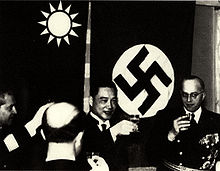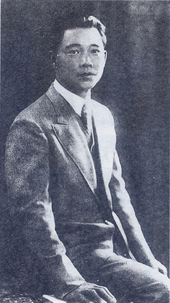Wang Jingwei
Wang Jingwei ( Chinese 汪精衛 / 汪精卫 , Pinyin Wāng Jīngwèi , W.-G. Wang Ching-wei ; born May 4, 1883 in Sanshui , Empire of China ; † November 10, 1944 in Nagoya , Japan ) was a Chinese politician from the 1920s to 1940s.
Wang Jingwei originally belonged to the left wing of the Kuomintang (National People's Party of China). But he fell out several times with their leader Chiang Kai-shek and finally even founded an anti-communist collaboration government with the Japanese based in Nanking .
biography
Early years
Wang Jingwei was born in Sanshui (三水), Guangdong Province , in 1883 and studied in Japan on a scholarship from 1903 . In 1905, Wang joined the Tongmenghui ( Chinese Revolutionary Union ) under Sun Yat-sen . In 1910 he tried to assassinate the regent 2nd Prince Chun (醇 親王). The attack failed and he was sentenced to life imprisonment. However, he only spent a year in prison and was freed during the revolution in 1911.
After his liberation and the establishment of the republic , he remained a supporter of Sun Yat-sen and became chairman of the Central Committee of the National People's Party of China, the Kuomintang ( KMT for short ), founded in 1912 .
Power struggle in the Kuomintang
After Sun's death in 1925, the party leadership was transferred to Chiang Kai-shek . Wang was the leader of the party's left wing at the time. After the capture of Wuhan (early 1927) during the northern campaign , which the Kuomintang still undertook together with the communists to crush the warlords in northern China, Wang pleaded for a break in the fighting, for the construction of Wuhan as the new capital and the continuation of cooperation with the communists.
Meanwhile, Chiang Kai-shek, who pressed for a swift continuation of the campaign, led a fight against the communists that led to the separation of the communist party from the Kuomintang in 1927. From Nanjing, Chiang Kai-shek was able to further expand the power base of the Kuomintang, while Wang tried in vain to set up a revolutionary counter-government in Wuhan together with the communists. Wang and his followers were equated with communists by Chiang, which led to persecution by the party's right wing. In September 1927, Wang and his followers again submitted to Chiang's leadership.
In the winter of 1928 Wang founded a faction in Shanghai with Chen Gongbo , Wang Leping and Gu Mengyu to reorganize the party. Chiang, who had meanwhile achieved Chinese reunification , was viewed by this group as a traitor to Sun's theories. As the leader of these so-called reorganizers , Wang was able to win several sympathizers. In 1929, the group was strongly condemned at the Kuomintang Congress, and Chen, Wang Leping and Gu were expelled from the party. Wang received a sentence.
This strengthened the group in their efforts to overthrow Chiang. Wang allied with Feng Yuxiang and Yan Xishan, two Chinese warlords who waged a civil war against Chiang. In July, Wang proclaimed a new Kuomintang capital in Beijing . In central China, Chiang's forces from Nanjing and Wang's armies clashed. There was no decisive battle because in September 1930 Zhang Xueliang , who commanded troops in Manchuria , fought on Chiang's side. Wang's troops were now in a two-front war and could be rolled up.
In 1930 Wang also traveled to Germany, where he sought contact with Adolf Hitler . After returning to China, he fled south, where he joined a movement in Guangzhou in support of Hu Hanmin against Chiang. This movement was weak, but it made peace possible for Wang and he was able to take up a post in Nanjing under Chiang as the leader of the Kuomintang.
War with japan
In the 1930s, Japan expanded into China, and in 1931 the Manchurian Crisis struck . Japan occupied Manchuria and established a puppet government. Wang reconciled with Chiang that same year and became head of government from 1932 to 1935. Wang sided with the war advocates, but Chiang rejected an open war against Japan because he wanted to save his strength for the internal disputes. The heavy military defeats in the Battle of Shanghai in 1932 and the defense of the Great Wall of China in 1933 caused Wang to rethink, who now considered a war against Japan to be impossible. Wang tried to find a political solution to the conflict, but he did not succeed against parts of the Kuomintang and Japanese interests.
In the 1936 Xi'an incident , the Kuomintang army mutinied against Chiang Kai-shek and kidnapped him until he was ready to form an alliance with the communists against Japan. A year later there was the incident at the Marco Polo Bridge and then the Second Sino-Japanese War . The Chinese troops were quickly repulsed by the Japanese army , despite unexpectedly strong resistance in the Second Battle of Shanghai . Wang fled Nanjing with the government when the city was captured by the Japanese in the Battle of Nanjing . Chongqing became an alternative capital and was then heavily bombed by the Japanese.
The Japanese, meanwhile, established a new Chinese government in Nanjing, which was led by some warlords under Liang Hongzhi and which was joined by individual Kuomintang units that were cut off during the retreat. However, the government actually had no influence.
Leader of the Reorganized Government of the Republic of China

In 1938, Wang fled Chongqing to Hanoi to negotiate peace with the Japanese spy Doihara Kenji . On March 30, 1940, under Japanese control, he founded the Reorganized Government of the Republic of China in Nanjing. The Japanese had previously dissolved Liang's government.
Wang urged the Chinese people to join his government that wanted to negotiate peace with the Japanese. With the exclamation of return to the capital ( 還 都 , huándū ), he tried to present Nanjing as the only possible capital and thus his government as the only true government, although Wang lived in Japan during the war. The Reorganized Government again invoked Sun's Three Principles of the People and even used the same flag as the Kuomintang, except that it printed " Peaceful, Anti-Communist, Constructive ".
The Japanese peace conditions were harsh, and approval was tantamount to capitulating: Japan wanted to station troops in northern China, special economic concessions in the Yangtze Valley and a ban on anti-Japanese efforts. The government should also accept Manchukuo's cession.
Wang signed the peace treaty. Nevertheless, the Japanese distrusted the government and Wang tried to offer himself as an ally to the Japanese. Even so, the government remained largely powerless and failed to convince the people. As it became increasingly clear that the Pacific War would be decided against Japan, the Japanese government allowed Wang to declare war on the United States and Great Britain in 1943 . Japan surrendered the foreign possessions and previously confiscated land to the government and gave the government more power. However, this came too late and the distrust of the government could not be lifted. The Japanese undertook peace missions to Chongqing in 1944, circumventing the Wang government. Wang died of illness on November 10, 1944 in Nagoya , Japan . Chen Gongbo followed him into office.
Individual evidence
- ^ Haldore E. Hanson: Humane Endeavor: The Story of the China War ; Farrar & Rinehart, 1939 p. 188
See also
literature
- David P. Barrett, Larry N. Shyu: Chinese Collaboration with Japan, 1932-1945. The Limits of Accommodation. Stanford University Press, Stanford CA 2000, ISBN 0-8047-3768-1 .
- Suisheng Zhao: Power by Design. Constitution-Making in Nationalist China. University of Hawaii Press, Honolulu HI 1996, ISBN 0-8248-1721-4 .
Web links
- Japan's Asian Axis Allies - Chinese National Government of Nanking ( Memento of March 10, 2012 in the Internet Archive )
- Newspaper article about Wang Jingwei in the 20th century press kit of the ZBW - Leibniz Information Center for Economics .
| personal data | |
|---|---|
| SURNAME | Wang, Jingwei |
| ALTERNATIVE NAMES | Wāng Jīngwèi; 汪精衛; 汪兆銘; Traitors to the Han people; 漢奸 |
| BRIEF DESCRIPTION | Chinese politician, chairman of the Japanese puppet government in China during World War II |
| DATE OF BIRTH | May 4, 1883 |
| PLACE OF BIRTH | Sanshui , China |
| DATE OF DEATH | November 10, 1944 |
| Place of death | Nagoya , Japan |
